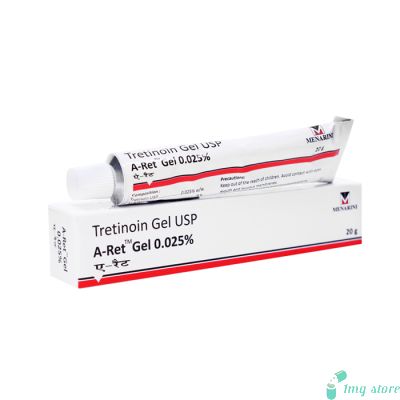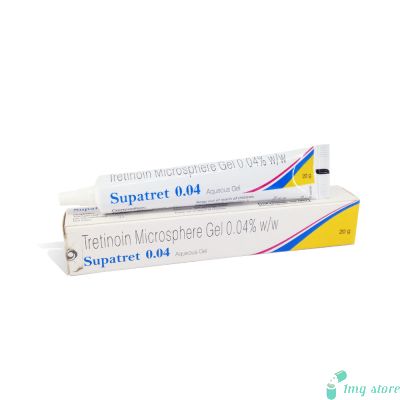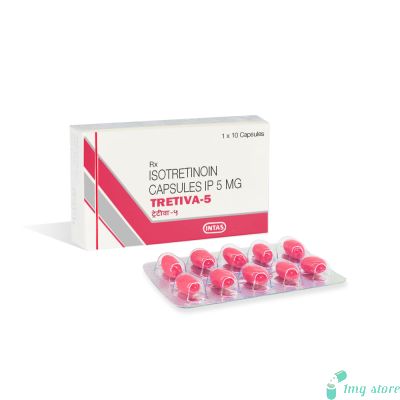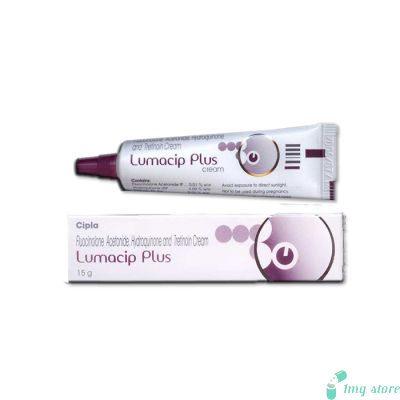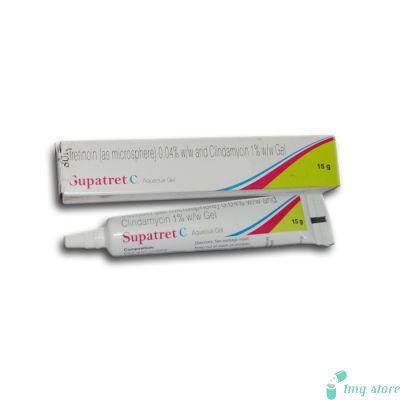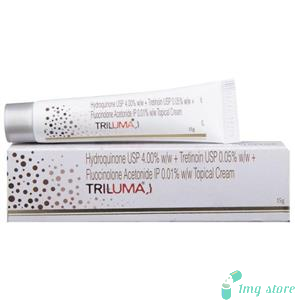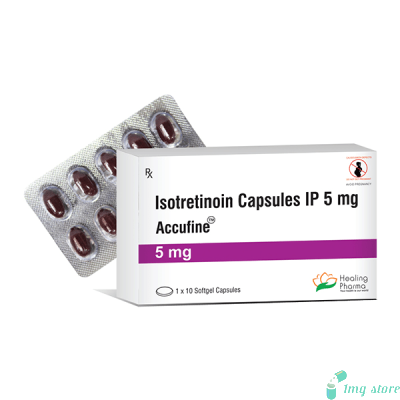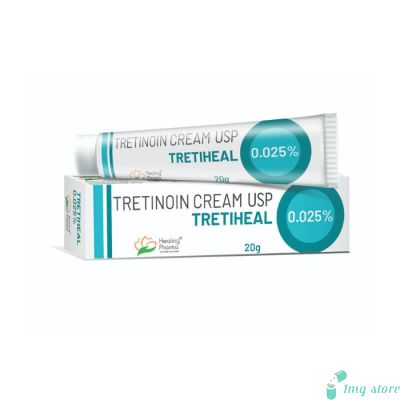Tretin Cream (Tretinoin)
Tretin Cream is a topical medication that contains the active ingredient tretinoin. It is primarily used for the treatment of acne and other skin conditions such as fine wrinkles, rough skin texture, and dark spots. Tretinoin belongs to a class of medications known as retinoids, which are derived from vitamin A.
Revitalize Your Skin with Retin-A Cream for a Youthful Glow
Tretin Cream, which contains the active ingredient tretinoin, is a topical medication widely used in dermatology for various skin conditions. Tretinoin is a derivative of vitamin A and belongs to the class of medications known as retinoids.
Tretin Cream is commonly prescribed for the treatment of acne vulgaris. It helps to unclog pores, reduce inflammation, and promote the shedding of dead skin cells. By increasing the turnover of skin cells, it prevents the formation of new acne lesions and improves the overall appearance of the skin.
In addition to acne, Tretin Cream is also used for other dermatological concerns. It is effective in minimizing the appearance of fine wrinkles, improving skin texture, and reducing the visibility of dark spots or hyperpigmentation caused by sun damage or melasma.
When using Tretin Cream, it is important to follow the instructions provided by your healthcare provider or the product labeling. Typically, a small amount of cream is applied once daily, usually in the evening, to clean and dry skin. It is essential to avoid contact with the eyes, mouth, and other sensitive areas.
At the beginning of treatment, Tretin Cream may cause some skin irritation such as redness, dryness, or peeling. This is often referred to as the "retinization" process and is considered normal. However, if the irritation becomes severe or persists, it is recommended to consult a healthcare professional.
It is crucial to protect your skin from excessive sun exposure while using Tretin Cream. Tretinoin can increase the skin's sensitivity to the sun, making it more susceptible to sunburn. Therefore, it is recommended to use sunscreen with a high SPF and wear protective clothing when exposed to sunlight.
Results from using Tretin Cream may not be immediate, and it may take several weeks or even months to notice significant improvements in your skin. It is essential to be patient and consistent with the application of the cream to achieve the desired results.
It is important to note that Tretin Cream should not be used by pregnant women or those planning to become pregnant, as it may cause harm to the fetus. It is always advisable to consult with a healthcare professional before using Tretin Cream, especially if you have any underlying medical conditions or are taking other medications.
Overall, Tretin Cream is a widely prescribed topical medication that can effectively treat acne, improve skin texture, and reduce the appearance of wrinkles and dark spots. It is essential to use it as directed and to follow a comprehensive skincare routine to achieve optimal results and maintain healthy, radiant skin.
Retin-A Cream for Skin is available for purchase at 1mgstore.com. This topical skincare solution contains tretinoin, a form of vitamin A known for its remarkable benefits in improving skin texture and appearance. Retin-A Cream works by stimulating collagen production, promoting cell turnover, and reducing the appearance of fine lines, wrinkles, and blemishes. Achieve a smoother, more youthful-looking complexion by buying Retin-A Cream online and incorporating it into your skincare routine.
When using Tretin Cream (Tretinoin), it is important to take the following precautions:
-
Consultation with a Healthcare Professional: Tretin Cream should be used under the guidance and prescription of a healthcare professional. They can determine the appropriate dosage, duration, and frequency of application based on your specific needs.
-
Avoid Sun Exposure: Tretinoin can increase the sensitivity of the skin to sunlight. It is important to protect your skin by wearing protective clothing and using sunscreen with a high sun protection factor (SPF) when going outdoors. Limiting sun exposure, especially during peak hours, can help prevent sunburn and potential skin damage.
-
Use Gentle Skincare Products: Avoid using harsh or irritating skincare products, such as abrasive cleansers, exfoliants, or products containing alcohol, while using Tretin Cream. These can further irritate the skin and potentially worsen side effects.
-
Gradual Introduction: Start using Tretin Cream gradually, especially if you have sensitive skin. Begin by applying it every other night or as advised by your healthcare professional, and then gradually increase the frequency as tolerated.
-
Moisturize: Tretinoin can cause dryness or peeling of the skin. Using a moisturizer can help keep the skin hydrated and minimize these side effects. Apply a non-comedogenic moisturizer after Tretin Cream has fully absorbed into the skin.
-
Avoid Contact with Eyes, Nose, and Mouth: Take care to avoid applying Tretin Cream near the eyes, nose, mouth, or any open wounds. If accidental contact occurs, rinse thoroughly with water.
-
Pregnancy and Breastfeeding: Tretinoin is not recommended for use during pregnancy or while breastfeeding, as it may have adverse effects on the fetus or infant. Consult with your healthcare professional for appropriate alternatives if you are planning to become pregnant or are currently pregnant or breastfeeding.
-
Inform your Healthcare Professional: Inform your healthcare professional about any other medications, skincare products, or supplements you are using, as they may interact with Tretin Cream. This includes other topical medications, especially those containing benzoyl peroxide or sulfur.
-
Patch Test: Before applying Tretin Cream to your entire face, perform a patch test on a small area of skin to check for any adverse reactions or sensitivity.
-
Follow Instructions: Follow the instructions provided by your healthcare professional and the product label carefully. Do not use more than the recommended amount or frequency, as it will not improve results and may increase the risk of side effects.
By adhering to these precautions, you can ensure the safe and effective use of Tretin Cream for your skincare needs. If you have any concerns or questions, consult with your healthcare professional for personalized advice and guidance.
Before purchasing Retin-A Cream for Skin online, it is important to be aware of a few precautions. First, consult with a dermatologist or healthcare professional to ensure that Retin-A Cream is suitable for your skin type and concerns. Tretinoin may cause skin sensitivity, redness, or peeling, especially during the initial weeks of use. It is important to protect your skin from excessive sun exposure and use a broad-spectrum sunscreen during the day. Pregnant or breastfeeding individuals should avoid using Retin-A Cream without consulting a healthcare professional. Purchase Retin-A Cream safely and conveniently at 1mgstore.com, and unlock the potential for healthier, more radiant skin.
Tretin Cream (Tretinoin) is commonly used for the treatment of various skin conditions. Here are the typical uses of Tretin Cream:
-
Acne Treatment: Tretin Cream is effective in treating acne vulgaris, a common skin condition characterized by clogged pores, pimples, and inflammation. It helps unclog pores, reduce the formation of new acne lesions, and improve the overall appearance of the skin.
-
Acne Scarring: Tretin Cream can also be used to improve the appearance of acne scars. It promotes skin cell turnover and collagen production, which can help reduce the visibility of acne scars over time.
-
Anti-Aging: Tretin Cream is often used as an anti-aging treatment. It helps reduce the appearance of fine lines, wrinkles, and age spots by increasing skin cell turnover and improving the overall texture and tone of the skin.
-
Hyperpigmentation: Tretin Cream can be used to lighten and reduce the appearance of hyperpigmentation, such as melasma, age spots, and sunspots. It helps even out skin tone by promoting the shedding of darkened skin cells and stimulating the production of new, healthier skin cells.
-
Rough or Dry Skin: Tretin Cream can improve the texture of rough or dry skin by promoting exfoliation and increasing moisture retention in the skin.
-
Keratosis Pilaris: Tretin Cream may be used to treat keratosis pilaris, a common skin condition characterized by small, rough bumps on the skin, typically on the arms, thighs, or buttocks. It helps exfoliate the skin and reduce the appearance of these bumps.
It is important to note that Tretin Cream should be used as directed by your healthcare professional. They will determine the appropriate strength and frequency of application based on your specific skin condition and response to treatment. It may take several weeks to notice significant improvements, and consistent use is necessary to maintain the benefits. It is advisable to consult with your healthcare professional for personalized advice and guidance regarding the use of Tretin Cream for your specific needs.
Incorporating Retin-A Cream into your skincare routine is simple. Start by cleansing your face thoroughly and patting it dry. Apply a pea-sized amount of Retin-A Cream to your fingertips and gently massage it onto your face, avoiding the delicate eye area. Start with a low concentration and gradually increase the frequency of use as your skin becomes accustomed to the product. It is best to use Retin-A Cream at night, as sunlight can make your skin more sensitive to the active ingredient. Purchase Retin-A Cream for Skin online at 1mgstore.com and follow the usage instructions for optimal results.
Tretin Cream (Tretinoin) can cause certain side effects, although not everyone will experience them. These side effects can vary in severity and may include:
-
Skin Irritation: The most common side effect of Tretin Cream is skin irritation, including redness, dryness, itching, and peeling. This typically occurs during the initial stages of treatment and may improve as your skin adjusts. Using a moisturizer and starting with a lower concentration of Tretin Cream can help minimize irritation.
-
Increased Sensitivity to Sunlight: Tretinoin can make your skin more sensitive to sunlight, increasing the risk of sunburn and skin damage. It is important to use sunscreen with a high sun protection factor (SPF) and protective clothing while exposed to the sun.
-
Temporary Worsening of Acne: In some cases, Tretin Cream can cause a temporary flare-up of acne. This is a normal reaction as the medication works to unclog pores and bring underlying acne lesions to the surface. It usually improves after a few weeks of consistent use.
-
Dry or Peeling Skin: Tretin Cream can cause dryness and peeling of the skin, particularly during the initial stages of treatment. Using a gentle moisturizer can help alleviate these symptoms.
-
Skin Discoloration: Tretin Cream may cause temporary or permanent skin discoloration, especially in individuals with darker skin tones. This can manifest as darkening or lightening of the skin. If you notice any significant changes in your skin color, consult your healthcare professional.
-
Allergic Reactions: Although rare, some individuals may experience allergic reactions to Tretin Cream. Symptoms may include rash, itching, swelling, severe dizziness, or difficulty breathing. Seek immediate medical attention if you develop any signs of an allergic reaction.
-
Eye Irritation: Avoid contact with Tretin Cream in or around the eyes, as it can cause irritation. If accidental contact occurs, rinse thoroughly with water.
It is important to follow the usage instructions provided by your healthcare professional and be patient as it may take several weeks to see significant improvement. If you experience severe or persistent side effects, or if you have any concerns, it is recommended to consult your healthcare professional for further guidance.
Here are some frequently asked questions (FAQs) about Tretin Cream (Tretinoin):
Q: What is Tretin Cream (Tretinoin)?
A: Tretin Cream is a topical medication that contains tretinoin, a derivative of vitamin A. It is commonly used for the treatment of acne, acne scars, hyperpigmentation, and signs of aging.
Q: How does Tretin Cream work?
A: Tretin Cream works by speeding up the skin cell turnover process, promoting the shedding of dead skin cells and the growth of new ones. It also helps to unclog pores, reduce inflammation, and stimulate collagen production, resulting in improved skin texture and appearance.
Q: How long does it take to see results with Tretin Cream?
A: Results with Tretin Cream can vary from person to person. Some individuals may start noticing improvements in their skin within a few weeks, while for others, it may take several months of consistent use. It is important to be patient and continue using the cream as directed by your healthcare professional.
Q: How should I apply Tretin Cream?
A: Wash your hands and clean the affected area before applying a thin layer of Tretin Cream. Avoid applying the cream to broken, sunburned, or irritated skin. Gently massage the cream into the skin until absorbed. It is usually applied once daily in the evening, but your healthcare professional may recommend a different frequency or dosage based on your specific needs.
Q: Can I use Tretin Cream with other skincare products?
A: It is generally recommended to avoid using harsh or irritating skincare products, such as abrasive cleansers or products containing alcohol, while using Tretin Cream. These can further irritate the skin. However, you can use non-comedogenic moisturizers to help minimize dryness and peeling.
Q: Can I use Tretin Cream during pregnancy or while breastfeeding?
A: Tretinoin is not recommended for use during pregnancy due to the potential risk to the fetus. It is also not recommended while breastfeeding as it may be excreted in breast milk. Consult with your healthcare professional for suitable alternatives if you are pregnant, planning to become pregnant, or breastfeeding.
Q: Can Tretin Cream be used on sensitive skin?
A: Tretin Cream may cause skin irritation, especially during the initial stages of treatment. If you have sensitive skin, it is recommended to start with a lower concentration of Tretin Cream and gradually increase the frequency of application as tolerated. If you experience excessive irritation, redness, or discomfort, consult your healthcare professional.
Q: Can I use Tretin Cream in the morning?
A: Tretin Cream is usually applied in the evening because it can make the skin more sensitive to sunlight. However, your healthcare professional may provide specific instructions based on your individual circumstances. It is important to follow their guidance and protect your skin from sun exposure by using sunscreen and wearing protective clothing.
Q: What should I do if I miss an application of Tretin Cream?
A: If you forget to apply Tretin Cream, simply resume your regular application schedule the following evening. Do not apply extra cream to make up for the missed dose.
These are general FAQs about Tretin Cream, but it is important to consult your healthcare professional for personalized advice and answers to any specific questions or concerns you may have.
Tretin Cream (Tretinoin) may interact with certain medications and skincare products. It is important to be aware of potential interactions to ensure the safe and effective use of the cream. Here are some notable interactions:
Benzoyl Peroxide: Concurrent use of Tretin Cream with products containing benzoyl peroxide may cause skin irritation and dryness. It is advisable to use these products at different times of the day or as directed by your healthcare professional.
Salicylic Acid: Using Tretin Cream alongside skincare products containing salicylic acid may increase the risk of skin irritation and dryness. It is recommended to use these products with caution and as directed by your healthcare professional.
Sulfur: Simultaneous use of Tretin Cream and products containing sulfur may lead to excessive skin dryness and irritation. Your healthcare professional can provide guidance on using these products appropriately.
Astringents: Astringent skincare products, such as those containing alcohol or witch hazel, can potentially worsen skin irritation when used in combination with Tretin Cream. It is advisable to avoid or minimize the use of such products while using Tretin Cream.
Topical Medications: Inform your healthcare professional about any other topical medications you are using, including prescription and over-the-counter products. Some medications may interact with Tretin Cream and affect its efficacy or increase the risk of side effects.
Skin Exfoliants: Avoid using harsh skin exfoliants, such as scrubs or brushes, while using Tretin Cream. These can increase skin sensitivity and potentially worsen irritation.
Photosensitizing Medications: Tretinoin may increase the skin's sensitivity to sunlight. If you are using other medications that can also cause photosensitivity, such as certain antibiotics or nonsteroidal anti-inflammatory drugs (NSAIDs), it is important to take extra precautions to protect your skin from the sun.
Other Topical Retinoids: Concurrent use of other topical retinoid medications, such as adapalene or tazarotene, with Tretin Cream may increase the risk of skin irritation. Your healthcare professional can provide guidance on using multiple topical retinoids appropriately, if necessary.
It is important to disclose all medications, skincare products, and supplements you are using to your healthcare professional before starting Tretin Cream. They can assess potential interactions and provide personalized advice on the most suitable skincare routine for you.
Experience the transformative benefits of Retin-A Cream for Skin by purchasing it online at 1mgstore.com. This dermatologist-recommended product offers a multitude of advantages for your skin. The active ingredient, tretinoin, has been clinically proven to improve skin elasticity, reduce the signs of aging, and fade dark spots and hyperpigmentation. Retin-A Cream also helps to unclog pores and prevent future breakouts, making it an ideal choice for those struggling with acne-prone skin. Enhance your skincare routine and enjoy the remarkable benefits of Retin-A Cream.
| Manufacturer | : | Hegde & Hegde, India |
| Equivalent Brand | : | Retin A Cream |
| Generic Search | : | Tretinoin |









